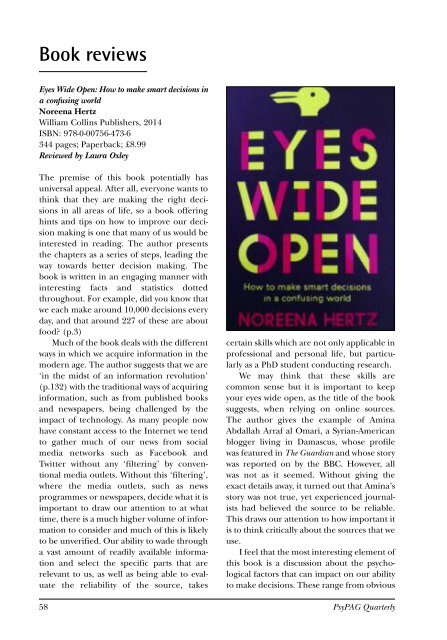Social Psychology Special Issue
PsyPAG-Quarterly-Issue-973
PsyPAG-Quarterly-Issue-973
You also want an ePaper? Increase the reach of your titles
YUMPU automatically turns print PDFs into web optimized ePapers that Google loves.
Book reviews<br />
Eyes Wide Open: How to make smart decisions in<br />
a confusing world<br />
Noreena Hertz<br />
William Collins Publishers, 2014<br />
ISBN: 978-0-00756-473-6<br />
344 pages; Paperback; £8.99<br />
Reviewed by Laura Oxley<br />
The premise of this book potentially has<br />
universal appeal. After all, everyone wants to<br />
think that they are making the right decisions<br />
in all areas of life, so a book offering<br />
hints and tips on how to improve our decision<br />
making is one that many of us would be<br />
interested in reading. The author presents<br />
the chapters as a series of steps, leading the<br />
way towards better decision making. The<br />
book is written in an engaging manner with<br />
interesting facts and statistics dotted<br />
throughout. For example, did you know that<br />
we each make around 10,000 decisions every<br />
day, and that around 227 of these are about<br />
food? (p.3)<br />
Much of the book deals with the different<br />
ways in which we acquire information in the<br />
modern age. The author suggests that we are<br />
‘in the midst of an information revolution’<br />
(p.132) with the traditional ways of acquiring<br />
information, such as from published books<br />
and newspapers, being challenged by the<br />
impact of technology. As many people now<br />
have constant access to the Internet we tend<br />
to gather much of our news from social<br />
media networks such as Facebook and<br />
Twitter without any ‘filtering’ by conventional<br />
media outlets. Without this ‘filtering’,<br />
where the media outlets, such as news<br />
programmes or newspapers, decide what it is<br />
important to draw our attention to at what<br />
time, there is a much higher volume of information<br />
to consider and much of this is likely<br />
to be unverified. Our ability to wade through<br />
a vast amount of readily available information<br />
and select the specific parts that are<br />
relevant to us, as well as being able to evaluate<br />
the reliability of the source, takes<br />
certain skills which are not only applicable in<br />
professional and personal life, but particularly<br />
as a PhD student conducting research.<br />
We may think that these skills are<br />
common sense but it is important to keep<br />
your eyes wide open, as the title of the book<br />
suggests, when relying on online sources.<br />
The author gives the example of Amina<br />
Abdallah Arraf al Omari, a Syrian-American<br />
blogger living in Damascus, whose profile<br />
was featured in The Guardian and whose story<br />
was reported on by the BBC. However, all<br />
was not as it seemed. Without giving the<br />
exact details away, it turned out that Amina’s<br />
story was not true, yet experienced journalists<br />
had believed the source to be reliable.<br />
This draws our attention to how important it<br />
is to think critically about the sources that we<br />
use.<br />
I feel that the most interesting element of<br />
this book is a discussion about the psychological<br />
factors that can impact on our ability<br />
to make decisions. These range from obvious<br />
58 PsyPAG Quarterly


